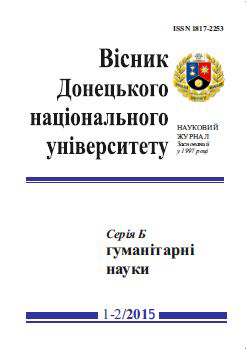Tolerance as a social construction element.
Keywords:
tolerance, society, symbol, interaction, constructAbstract
This article focuses on the theoretical filling and the need to update the phenomenon of tolerance at the beginning of the XXI century. The author determined the specific properties of historical models of tolerance, which laid the foundation for the execution of the current state of events. The work is defined as a philosophical and historical and pragmatic reasons in the transformation phenomenon of tolerance. At the beginning, the author begins to review the historical-philosophical subtext formation phenomenon of tolerance. Simultaneously, the article author developed view of the state of the phenomenon of tolerance in a separate historic time: at the end of the XX — XXI century. The author points out the aims and disadvantages of each model specified tolerance and denotes those social phenomen that have become critical to the execution of the phenomenon of tolerance. The article showing historical examples where the phenomenon of tolerance can radically change the situation and vice versa, when the phenomenon of tolerance could lead to fatal consequences in some countries or entire continents. Also highlights the problems of fundamentalism (religious, ethnic, etc.), which begins in the XXI Century reduce the effectiveness of the finished model of tolerance formed in the late twentieth century. Specifies the connection processes of capitalism, Protestantism and tolerance, speaking intermediary between them. Attention is drawn to the need to reformat and tolerance through the failed policy of multiculturalism Western world. The author draws parallels between tolerance and other phenomena that affect the development of modern societies, language, religion, ideology and so on. In this paper special attention affects the communicative and symbolic component of the phenomenon of tolerance. It is claimed that in the XXI century acute need for maximum impact on social phenomen and tolerance there appears one of the most necessary tools. Also noted bound tolerance and political component of local conflicts on the example of the late XX — early XXI century. The article indicates the change in the functional content of the phenomenon of tolerance in the early twenty-first century, and provides active current model of "denial of tolerance". Bold this model, the author explains in detail and argues paying attention to the socio-historical elements that led to this state of affairs. In conclusion represented a possible alternative to the current model of "denial of tolerance". Tolerance is analyzed in terms of the synergistic approach to the peculiarities of its functioning, methodologies symbolic interactionism and social constructivism. The article indicated by the general characteristics and key moments in the development of Western society, formed at the request format tolerance to certain historical stages. The author emphasizes the specificity and the emergence of the modern alternative factors influencing the phenomenon.References
Философский энциклопедический словарь / Под ред. А.Б. Васильева. – 2-е изд. – Москва : Инфра-М, 2011. – 576 с.
Viktor Emil Frankl. Wörterbuch der Logotherapie und Existenzanalyse. http://edoc.sub.unihamburg.de/hsu/volltexte/2014/3063/pdf/LogosundCrisisEndversionServer.pdf
Локк Дж. Послание о веротерпимости / Дж. Локк / Сочинения в 3 т. – Москва : Политиздат, 1988. Т.3. – 668 с.
Матраверс М.Д. Проблема толерантности в англо-американской философии / М.Д. Матраверс // Толерантность: Материалы Летней школы молодых ученых «Россия-Запад: философские основания социокультурной толерантности» / Под ред. М.Б. Хомякова. – Екатеринбург: Уральский университет, 2001. – С.3.
Семашко M.A. Развитие термина «толерантность» в гуманитарных науках / М.А. Семашко. [Електронний ресурс] // Электронный научно-педагогический журнал // Режим доступа: http://www.emissia.org/offline/2007/1204.htm
Кассирер Э. Философия символических форм. В 3х томах / Э. Кассирер. Том 1. – СПб : Университетская книга, 2002. – 272 с.
Васильев В.В. Сёрл: проще простого! / В.В. Васильев // Трудная проблема сознания. – 2009. – С. 54-105.
Grytten O. H. The Protestant Ethic and the Spirit of Capitalism: ntrepreneurship of the Norwegian Puritan Leader Hans Nielsen Hauge // Review of European Studies, 2013, № 5/1 // http://ccsenet.org/journal/index.php/res/article/view/24910
Символический интеракционизм Дж. Мида, Ч. Кули и Г. Блумера // Американская социологическая мысль / Под ред. В.И. Добренькова. – Москва : МГУ, 1994. – С.99-118.

